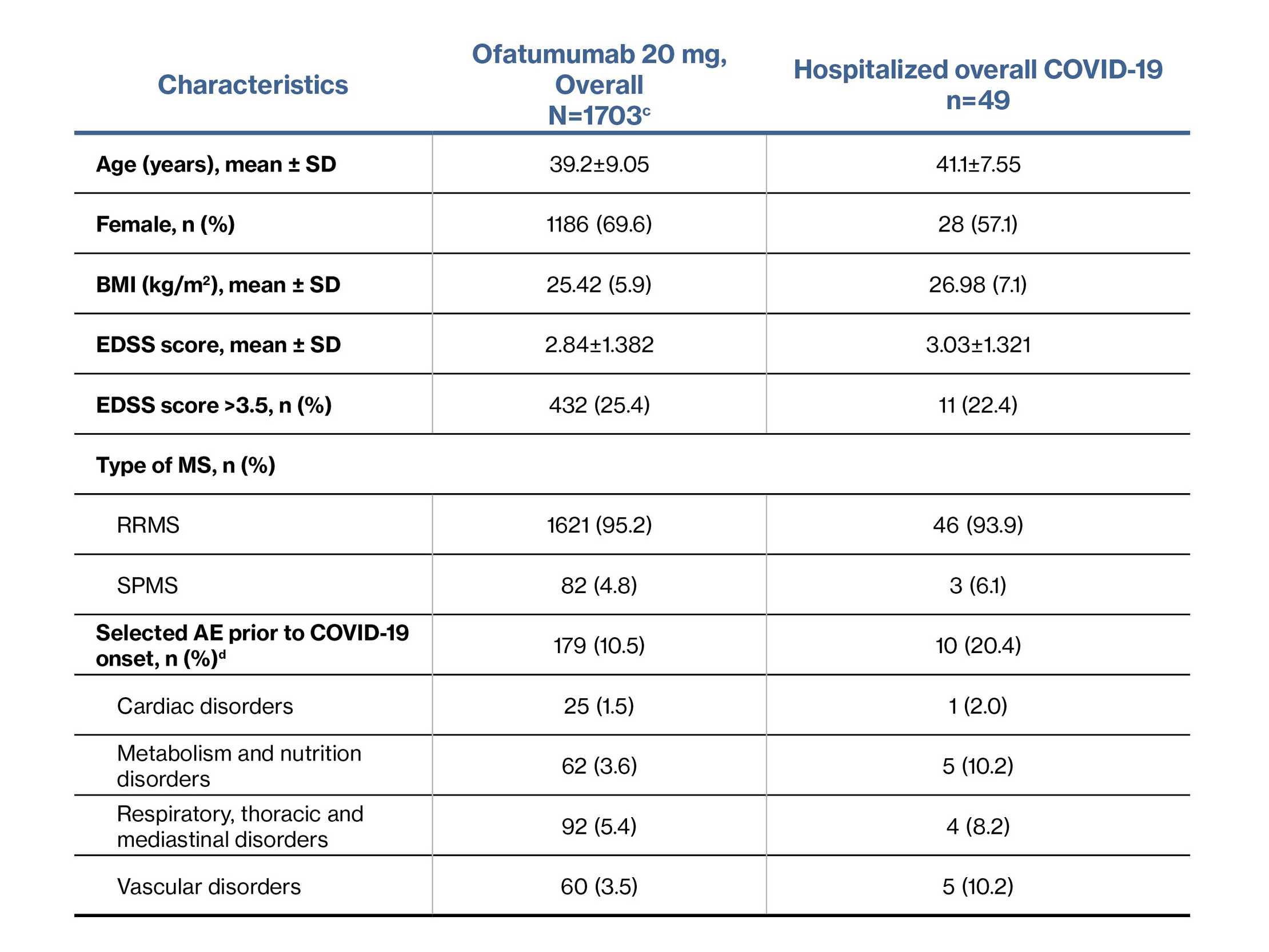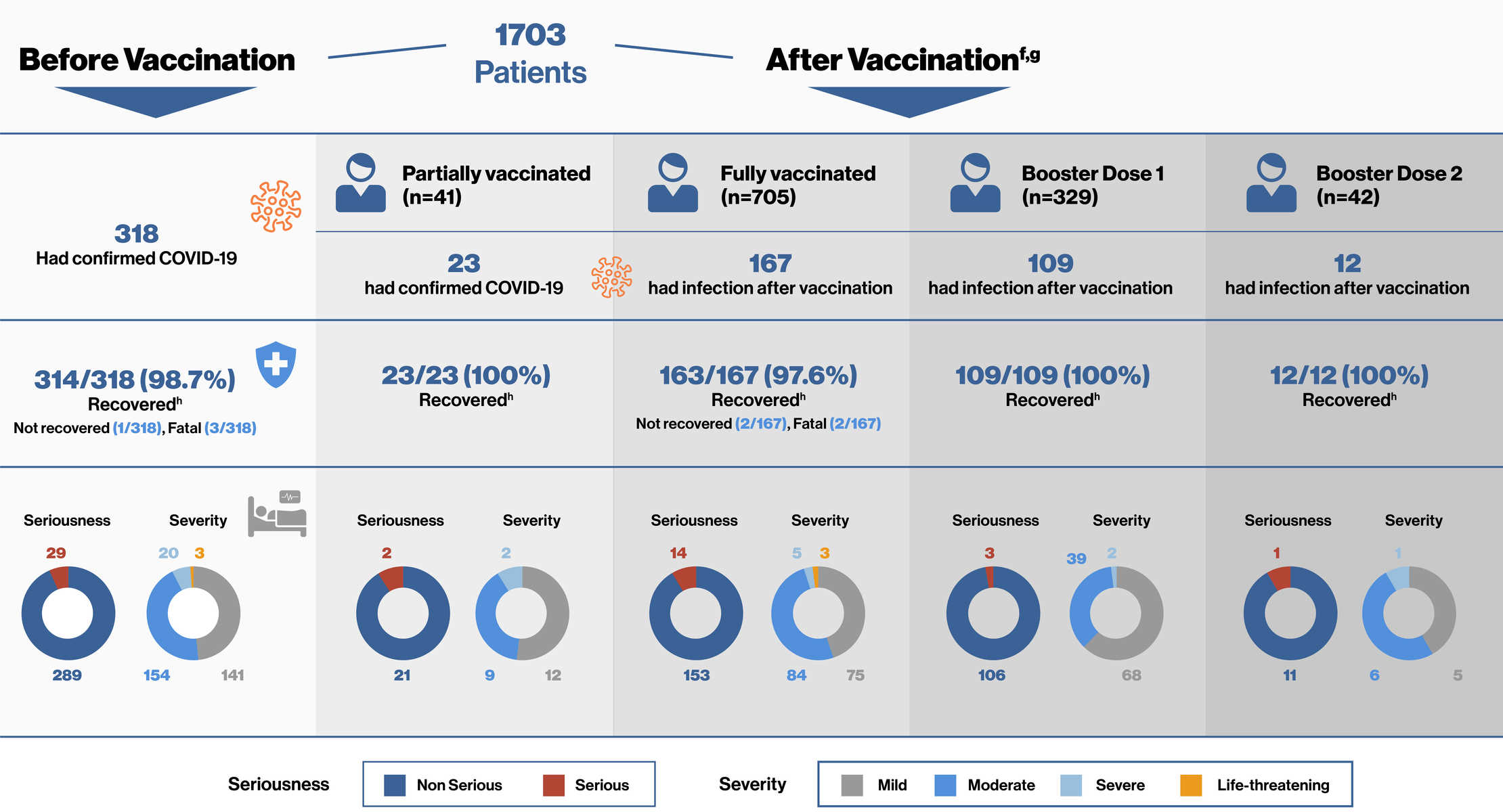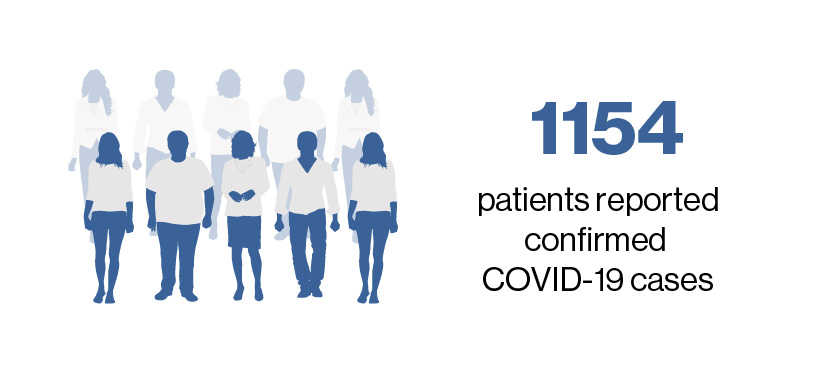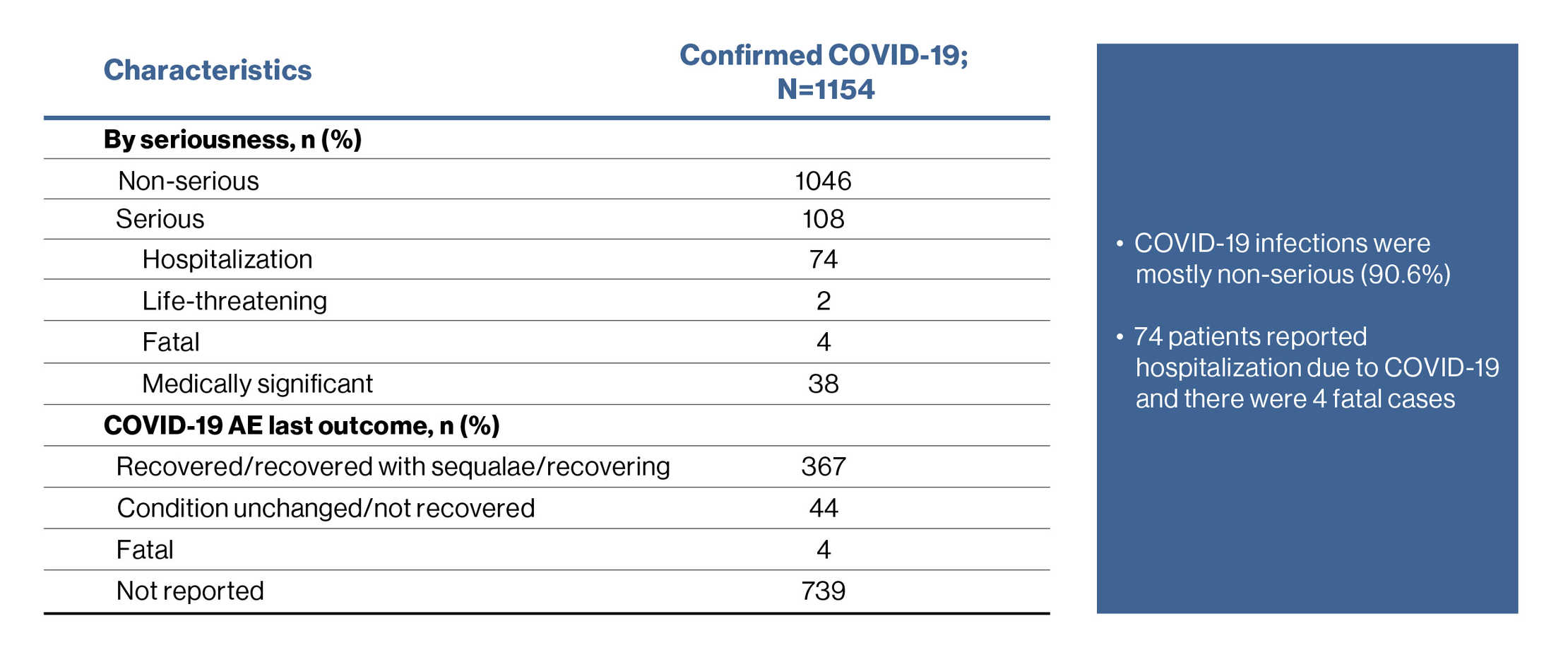Home > Key safety topics > COVID-19
In the ALITHIOS open-label extension trial (25-Sep-2022)1
- At the Data cut-off, 38% (648/1703) of ofatumumab-treated patientsa entering ALITHIOS reported COVID-19 (confirmed [n=603]; suspected [n=45])
- Most were mild-to-moderate in severity (93.9%)
- Most COVID-19 cases were non-serious (92.3%)
- Most patients recovered (98.6%)

aMean age at baseline: 39.2 years; females, 69.6%; BMI ≥30 kg/m2, 18%; bAt the time of the data cutoff.
- Except for the known risk factors for serious COVID-19, such as male sex and higher BMI, no other risk factors have been identified
- Time of ofatumumab exposure was not associated with an increased risk of serious COVID-19
- Only 3.8% (n=64) of patients had a COVID-19 reinfection (at the onset of infection, 26 unvaccinated, 4 partially vaccinated, 22 fully vaccinated, 10 received booster doses, 2 received ≥2 booster doses)
- Baseline characteristics of COVID-19 cases in the overall and hospitalized cases are presented in table below
Baseline characteristics of COVID-19 cases

AE, adverse event; BMI, body mass index; EDSS, Expanded Disability Status Scale; MS, multiple sclerosis; RRMS, relapsing-remitting MS; SD, standard deviation; SPMS, secondary progressive MS, cThis represents the enrolled population in the ALITHIOS study. dThe selection of prior AEs was based on the following MedDRA System Organ Classes: “Cardiac disorders,’ ‘Metabolism and nutrition disorders,’ ‘Respiratory, thoracic and mediastinal disorders,’ and ‘Vascular disorders’.
Summary of COVID-19 cases
- There were 5 patient deaths (5/648; 0.8%); three patients were unvaccinated; two patients were fully vaccinatede
- The five fatal cases consisted of: COVID-19 [n=2], COVID-19 pneumonia (n=1), COVID-19 and COVID-19 pneumonia (n=1), COVID-19 pneumonia and pneumothorax (n=1)
- Most patients (87.5%) did not interrupt ofatumumab treatment; only 5 patients discontinued the treatment due to COVID-19 or COVID-19 pneumonia
eFully vaccinated is at least 14 days after completing the primary vaccine series, which may or may not be after a booster dose. These two fatal cases occurred before a booster dose, one case had multiple risk factors for severe COVID-19 and the other case which was complicated by a bilateral pneumothorax.
COVID-19 Outcomes by Vaccination Status

- Most of the fully vaccinated patients (75.6%) received an mRNA-based vaccine
- The post-vaccination COVID-19 cases mostly occurred when the SARS-CoV-2 Omicron variant was the dominant strain globally
- Majority of cases were mild-to-moderate in severity (n=299/312; 95.8 %) and recoveredh (n=308/312; 98.7%)
- Of the 746 patients with a COVID-19 vaccination, 55 (7.4%) had a confirmed ofatumumab dose interruption; median duration of treatment gap was 59 days
f746 patients were vaccinated; g4 patients had ≥3 booster doses of which 1 patient had COVID-19 infection (Grade 1) who recovered; hincludes patients who have recovered, recovering, and recovered with sequalae.
mRNA, messenger ribonucleic acid; SARS-CoV2, severe acute respiratory syndrome coronavirus 2.
In the post-marketing setting

- As of 25-Sep-2022, the cumulative post-marketing patient exposure since the first launch of ofatumumab up to data cut off is estimated to be ~ 37,127 patient-treatment years
- A total of 1154 confirmed COVID-19 cases were reported to the Novartis Safety Database from the post-marketing setting in ofatumumab-treated patients
Summary of confirmed cases: N=1154


A case may have more than one seriousness criteria
AE, adverse event; HCP, healthcare professional.

Additional information


Immune response to COVID-19 vaccines in plwMS under ofatumumab treatment
Novartis is conducting/supporting various clinical studies to evaluate the effect of immune response to SARS-CoV-2 mRNA vaccination and other vaccines in MS patients treated with DMTs. Please see below for additional details
Additional information





Impact of COVID-19 in MS in the real-world setting
- MS is an autoimmune, chronic inflammatory, neurodegenerative disorder of CNS where patients are generally treated with immunosuppressants or immunomodulators.3 The current COVID-19 pandemic has raised concerns regarding the immune response to viral infections and post vaccination in MS patients treated with disease modifying therapies4
- Comprehensive data sharing and analyses regarding the effect of COVID-19 in people with MS have been conducted by the COVID-19 in MS - GDSI.5 The GDSI initiative is a joint initiative of the MS International Federation and the MS Data Alliance, acting under the umbrella of the European Charcot Foundation and in collaboration with many (data) partners across the globe
- In people with MS, the incidence of COVID-19 varies from 0.5% to 1.13%.6 The mortality due to COVID-19 has been reported from 1.6% to 4.2%7,8
- Prosperini L, et al. reported crude death rate of 1.97% and estimated indirectly-adjusted age-standardized lethality ratio to be 1.24 suggesting 24% increased risk of death from COVID-19 in patients with MS9. That excess of risk of mortality due to COVID-19 was confirmed by the Italian MusC-19 Study Group only for those patients who belonged to the ‘higher-risk- group' (EDSS > 3.0 or at least 1 comorbidity).10
Ofatumumab and COVID-19 – Guidance to HCPs
- Novartis is committed to patient's health and safety. In these unprecedented times, we are striving to keep patients, care partners, and healthcare providers up to date and provide the latest information to help inform decisions related to the use of our products. Novartis continues to collect data about COVID-19 infection in patients treated with ofatumumab.
- In general, patients and prescribers should act in accordance with local government and health authority guidance concerning the COVID-19 pandemic (including guidance on social distancing and self-isolation, as applicable). HCPs may also consult advice specific to patients with MS provided by international or local HCPs and patient organizations11-13
- Ofatumumab has the potential for an increased risk of infections.3,14 Administration should be delayed in patients with an active infection until the infection is resolved.3,14 Novartis believes that treatment decisions should be made between a patient and their treating healthcare professional based on a benefit-risk assessment specific to the individual patient.
SARS-CoV-2 vaccination considerations
- To date all of the SARS-CoV-2 vaccines currently approved and available or in development belong to several categories/platforms, namely : (1) mRNA-based vaccines, (2) nonreplicating viral-vector vaccines, (3) inactivated vaccines, (4) protein vaccines and (5) live attenuated vaccines
- As with inactivated vaccines, the use of nonreplicating viral-vector vaccines or mRNA based SARS-CoV-2 vaccines in patients receiving immunomodulant/immunosuppressant therapies such as ofatumumab may have a diminished immune response
- Novartis is conducting several clinical studies to evaluate the humoral and cellular immune response post COVID-19 vaccination in people living with RMS receiving treatment with ofatumumab according to the regular clinical practice. Some preliminary results from their interim analysis are already available.15,16,17
- To date the available data of the occurrence and severity of breakthrough infections after a full course of vaccination in plwMS is very scarce. Its frequency varies from 2% for Delta variant to 6% for Omicron variant (Italian and Danish studies)18, 19
- There is presently no contraindication for the use of inactivated, nonreplicating viral-vector, or mRNA-based SARS-CoV-2 vaccines while on treatment with ofatumumab, even if vaccinations may be less effective3,14
- Vaccination against SARS-CoV-2 should be considered on a case-by-case basis at the discretion of the treating physician and should be in adherence to immunization guidelines in the local vaccine label20
- Please review local prescribing information for any specific SARS-CoV-2 vaccine and comply with local prescribing information requirements for specific contraindications and special warnings and precautions for use
- People with MS who are considered to be immunocompromised could be advised to receive an additional dose of COVID-19 vaccine depending on local recommendations of their countries21. In some countries some other prophylaxis treatment could also be available as add-on strategy to minimize the risk of getting infected by SARS-CoV-2.22
- All immunizations should be administered according to local immunization guidelines, at least 4 weeks prior to initiation of ofatumumab for live or live-attenuated vaccines and, whenever possible, at least 2 weeks prior to initiation of ofatumumab for inactivated vaccines3,14
- The safety of immunization with live or live-attenuated vaccines following ofatumumab therapy has not been studied. Vaccination with live or live-attenuated vaccines is not recommended during treatment and after discontinuation until B-cell repletion3,14
- The guidance provided by National Multiple Sclerosis Society (NMSS) suggests that people with MS who are fully vaccinated with an mRNA vaccine and using S1PR modulators, alemtuzumab, and anti-CD20 therapies may benefit from an additional dose of mRNA vaccine23,24
- Regarding the use of REGEN-COV* (casirivimab and imdevimab, administered together) as post-exposure prophylaxis (preventative) for COVID-19, the NMSS said that is safe to use with MS disease modifying therapies (DMTs), but the timing might need to be coordinated.25
- Some other countries and regions are also recommended to go for additional dose of vaccine after being fully vaccinated in people with immunosuppressive conditions (due to their disease or their treatment)26-32 and they are also considered some pre- and post-exposure prophylaxis* agents to be used in some people on higher risk of more severe course of COVID-19 (plwMS could be included in).25
*All pre and post-exposure prophylaxis should be administered according to local guidelines and the corresponding product information.

FAQs
1. Where do I find safety information related to COVID-19 infections with ofatumumab treatment?
- Novartis is committed to proactive and transparent safety communications of data related to COVID-19 infections with the MS community regularly in the coming months (e.g., local label, publications and website)
- Please refer to the ofatumumab Prescribing Information for relevant information regarding the risk of infections.
2. Should RMS patients initiate treatment with ofatumumab?
- Prior to initiating therapy, follow local guidelines on testing for SARS-CoV2. Patients can initiate therapy with ofatumumab in accordance with Prescribing Information approved by your national regulatory authorities.
3. Are patients on therapy with ofatumumab at a higher risk for COVID-19 infection?
- Based on its mode of action of depleting B cells, ofatumumab has the potential for an increased risk of infections, including COVID-19. Patients should consult with their physicians and treatment decisions should be made based on individual patient benefit-risk assessment. Please refer to the Prescribing Information for information regarding the safety of ofatumumab
4. Does treatment with ofatumumab cause a more severe course of SARS CoV-2 infection?
- There is no consistent evidence that MS patients treated with B-cell targeting therapies are at a higher risk for a more severe course of infections. Although, most of the registries currently on going reported a higher risk of having a more severe course of COVID-19 in plwMS exposed to RTX or OCR (including hospitalization but not death), the available information for ofatumumab in these registries is nearly zero. Among plwMS, risk factors for a more severe course of infection seem to be higher EDSS score, recent use of corticoids, progressive MS phenotype, obesity, age, and comorbidities. 5-9,34-38
- Our clinical data suggest that COVID-19 follows a similar course of SARS CoV-2 infection in ofatumumab-treated patients as in the general population2
- The known benefit-risk of ofatumumab remains unchanged. Patients should consult with their physicians and treatment decisions should be made based on individual patient benefit-risk assessment. Please refer to the Prescribing Information for information regarding the safety of ofatumumab
5. Should patients interrupt or discontinue therapy with ofatumumab if they are diagnosed with COVID-19?
- Limited data are available for providing any specific recommendations for people treated with ofatumumab
- Therapy with ofatumumab may need to be temporarily interrupted if a patient has a confirmed or suspected diagnosis of COVID-19 and/or severe symptoms; treatment can be restarted after COVID-19 resolution. Though the known benefit-risk of ofatumumab remains unchanged, physicians should make decisions based on individual patient benefit-risk assessment
- From the limited clinical study data, COVID-19 outcomes do not indicate a difference between ofatumumab-treated patients and the general population2
6. What is the guidance for ofatumumab treatment following a delay of a scheduled dose?
- Any delay in the scheduled ofatumumab administration is considered a ‘missed dose’. Please refer to your country national regulatory authority approved ofatumumab Prescribing Information for guidance on missed dose
- Per the country’s national regulatory authority approved ofatumumab Prescribing Information, if an injection of ofatumumab is missed, it should be administered as soon as possible without waiting until the next scheduled dose. Subsequent doses should be administered at the recommended intervals
References
1. Wiendl H, et al. Poster presented at EAN 2023.
2. Cross AH, et al. Neurol Ther. 2022.
3. KESIMPTA® [EU Summary of Product Characteristics]. Novartis Ireland Limited; EU/1/21/1532/001-004, 19 March 2024.
4. Rostami Mansoor S, et al. J Med Virol. 2021;93:1314-1319.
5. Simpson-Yap S, et al. BMJ. 2021; 97:e1870-e1885.
6. Reder AT, et al. CNS Drugs. 2021; 35:317-330.
7. Btseh G, et al. PLOS ONE. 2021; 16:e025531.
8. Sormani MP, et al. Ann. Clin. Transl. Neurol. 2022; 8:1738-1744.
9. Prosperini L, et al. J Neurol. 2021:1-7.
10. Sormani MP, et al. Neurol Neuroimmunol Neuroinflamm 2022.
11. World Health Organization. Coronavirus disease (COVID-19) outbreak. Accessed November 24, 2020. https://www.who.int/emergencies/diseases/novel-coronavirus-2019
12. European Centre for Disease Prevention and Control. COVID-19. Accessed November 24, 2020. https://www.ecdc.europa.eu/en/novel-coronavirus-china
13. US Centers for Disease Control and Prevention. Coronavirus Disease 2019 (COVID-19). Accessed November 24, 2020. https://www.cdc.gov/coronavirus/2019-ncov/hcp/clinical-guidance-management-patients.html#clinical-management-treatment%3C
14. KESIMPTA® [US Prescribing Information]. Novartis Pharmaceuticals Corporation; 12 Apr 2024.
15. Cross A, et al. Poster presented at ACTRIMS 2022.
16. Sabatino J, et al. Poster presented at ACTRIMS 2022.
17. Ziemssen T, et al. Poster presented at ECTRIMS 2021.
18. Sormani MP et al. eBiomedicine 2022, doi:10.1016/j.ebiom.2022.104042
19. Stærke NB, et al. Nat Commun. 2022 Aug 1;13(1):4466. doi: 10.1038/s41467-022-32254-8. PMID: 35915081
20.Centers for Disease Control and Prevention. Interim Clinical Considerations for Use of mRNA COVID-19 Vaccines Currently Authorized in the United States. Accessed February 10, 2021. https://www.cdc.gov/vaccines/covid-19/info-by-product/clinical-considerations.html
21. MS International Federation. COVID-19. Accessed June 22, 2023. http://www.msif.org/wp-content/uploads/2021/06/June-2021-MSIF-Global-advice-on-COVID-19-for-people-with-MS-FINAL.pdf
22. National MS society: Prevention and Treatment of COVID-19. Accessed June 22, 2023. https://www.nationalmssociety.org/coronavirus-covid-19-information/multiple-sclerosis-and-coronavirus/suspected-covid-19-and-ms.
23. National MS Society. COVID-19 vaccine boosters and additional doses. Accessed June 22, 2023. https://www.nationalmssociety.org/coronavirus-covid-19-information/multiple-sclerosis-and-coronavirus/covid-19-vaccine-guidance/COVID-19-Vaccine-Boosters-and-Additional-Doses.
24. US Food and Drug Administration. Coronavirus (COVID-19) Update: FDA Authorizes Additional Vaccine Dose for Certain Immunocompromised Individuals. Accessed June 22, 2023,. https://www.fda.gov/news-events/press-announcements/coronavirus-covid-19-update-fda-authorizes-additional-vaccine-dose-certain-immunocompromised
25. National Multiple Sclerosis Society.MS, the coronavirus and vaccines – updated global advice. Accessed May 20, 2022. The coronavirus and MS – updated global advice (msif.org)
26.United Nations. WHO advisory group recommends extra COVID-19 vaccine dose for immunocompromised. Accessed June 22, 2023. https://news.un.org/en/story/2021/10/1102732
27. Reuters. Factbox - Countries weigh need for booster COVID-19 shots. Accessed October 27, 2021. https://www.reuters.com/article/us-health-coronavirus-booster-idUKKBN2GA190.
28. Sormani MP, et al. Lancet Neurol. 2020;19:481-482.
29. Simpson-Yap S, et al. Oral Presentation at ECTRIMS, 2021.
30. Sormani MP, et al. Ann Neurol. 2021; 89:780-789.
31. Bsteh G. Oral Presentation at ECTRIMS 2021.
32. Salter A, et al. JAMA Neurol. 2021; 78:699-708.